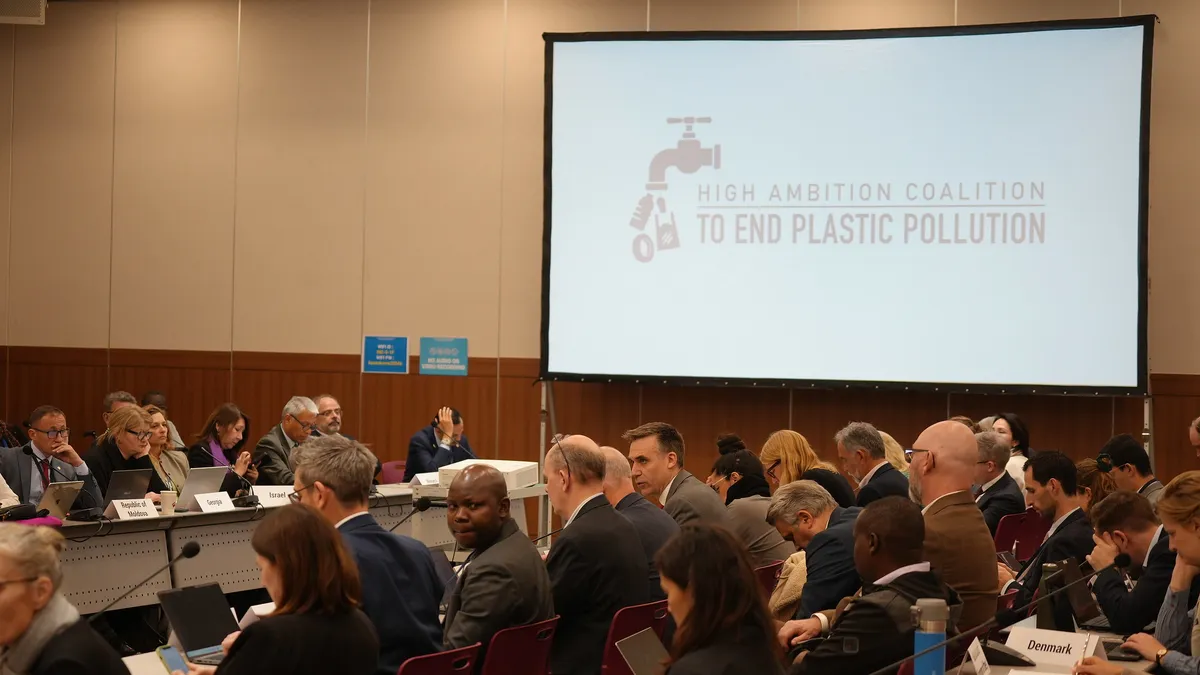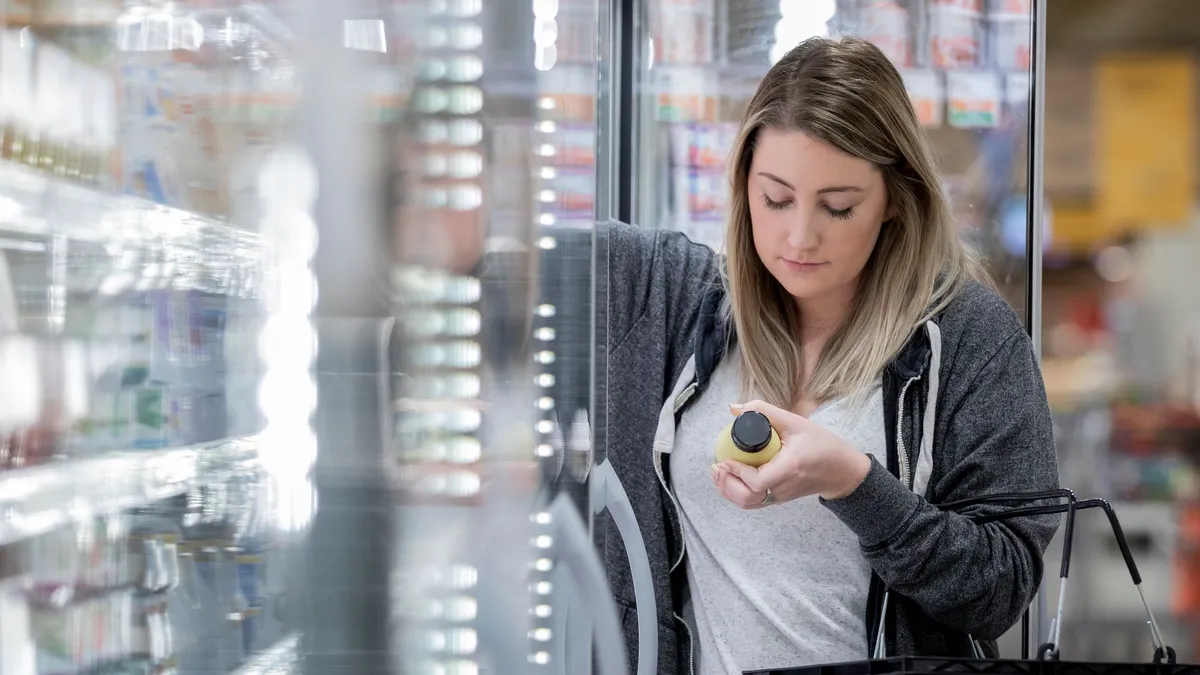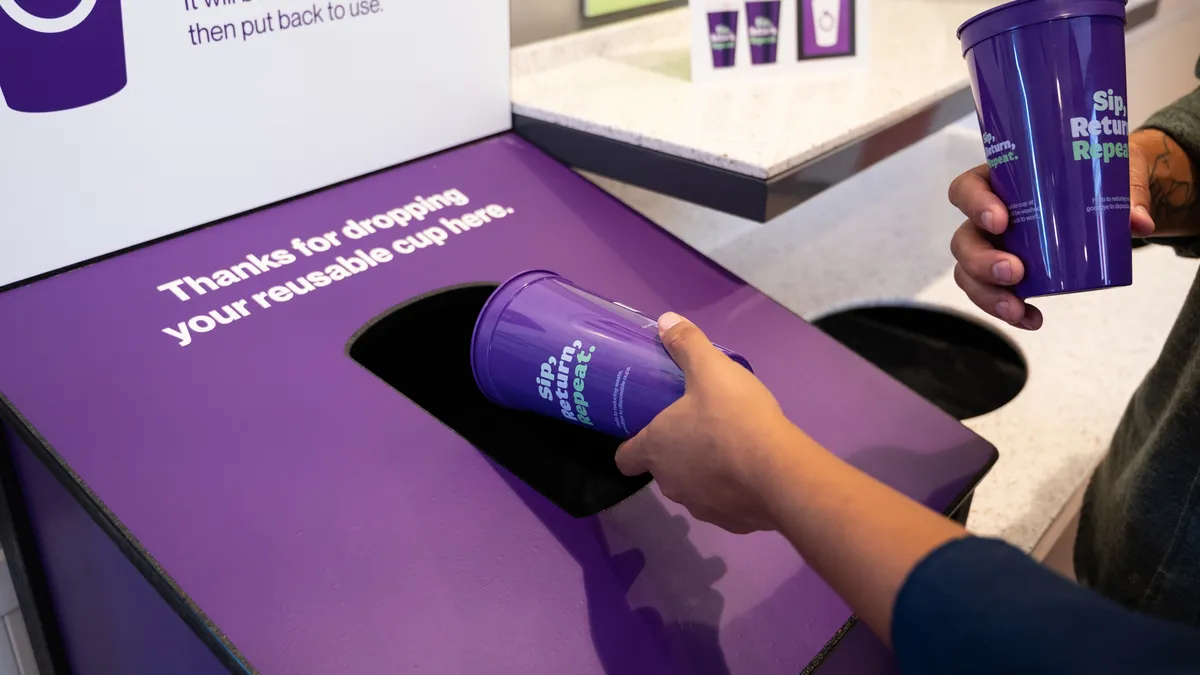Dive Brief:
- Negotiators representing governments, business interests and environmental groups from around the world did not finalize an agreement to end plastic pollution at the fifth Intergovernmental Negotiating Committee (INC-5) meeting in Busan, South Korea, from Nov. 25 to Dec. 1.
- Tenets for consideration included instituting production caps and agreeing to phase out certain problematic chemicals and products.
- As a result, there will be another meeting in 2025. Before adjourning in Busan, participants did agree on a "Chair’s Text" that will serve as the starting point for those not-yet-scheduled negotiations, the United Nations Environment Programme said in a Dec. 2 press release.
Dive Insight:
In March 2022, nations agreed to develop an international legally binding instrument on plastic pollution, addressing the entire life cycle of plastic. The expectation was to complete negotiations by the end of 2024.
Four previous INC meetings took place across 2022, 2023 and 2024. This fifth meeting in Busan was supposed to be the last. More than 3,300 delegates representing at least 170 nations and 440 organizations participated in INC-5.
Participants expressed frustration and disappointment over the failure to reach an agreement by the end of 2024. But some also said it allows the opportunity to still reach a strong agreement, while a conclusion in Busan could have risked a weaker outcome.
UNEP Director Inger Andersen said that INC-5 made “good progress” toward a deal.
“Through the Busan talks, negotiators have reached a greater degree of convergence on the structure and elements of the treaty text, as well as a better understanding of country positions and shared challenges,” she said in a statement. “But it is clear there is persisting divergence in critical areas and more time is needed for these areas to be addressed."
Leading oil and plastic-producing nations, including Saudi Arabia, were in conflict with countries favoring limits on plastic production.
The Business Coalition for a Global Plastics Treaty — which is endorsed by Amcor, Berry Global, Mondi and dozens of other packaging converters, retailers and brand owners — said it was encouraged by growing consensus among more than 100 countries regarding global phase-outs and plastic production levels.
“Never before have so many countries clearly articulated support for these obligations. The latest text from the INC Chair is also a step forward on product design and waste management as a basis for future negotiations,” the group wrote.
But the inconclusive result leaves businesses operating in an uncertain environment, which hurts their ability to mobilize investment and greater action, the coalition says. Going forward, governments could “continue negotiating a treaty with universal support but little impact. Or they can agree on a treaty based on strong global rules across the full lifecycle of plastics and with a comprehensive financing mechanism,” the group wrote.
The American Chemistry Council shared a statement from the Global Partners for Plastics Circularity, which is supported by country and regional plastic associations around the world.
“It is crucial that this treaty stays focused on addressing the primary cause of plastic pollution—mismanaged waste,” said ACC CEO Chris Jahn. Speaking on behalf of GPPC, he emphasized increasing access to waste collection systems, as opposed to “supply restrictions or duplicative measures on chemicals in plastics.”
Jahn called for an agreement that pushes for recycled plastic targets in national action plans and guidance for designing plastics for reuse and recycling. “Governments should not let the pursuit of perfection stand in the way of achieving a good agreement that is within reach,” he said.
The World Wildlife Fund is still calling for an agreement that includes global bans and phaseouts of some plastics and chemicals, robust financing, and “means for strengthening the treaty over time.”
“It has now been over 1,000 days and five negotiation meetings since governments agreed to establish a legally binding treaty to end plastic pollution,” Eirik Lindebjerg, global plastics policy lead for WWF, said in a statement. “Over this time, more than 800 million tonnes of plastic has been produced, over 30 million tonnes of which have leaked into our ocean, harming wildlife, poisoning ecosystems and destroying lives, to say nothing of the plastic that has been sent to landfill or burnt.”
In a separate statement, the Ocean Conservancy's director of plastics policy acknowledged that the added meeting in 2025 means a potential treaty would be finalized with the Trump administration at the helm in the United States, rather than under President Joe Biden. “Addressing plastic pollution is not a partisan issue,” said Anja Brandon. “We hope that any administration will respect the will of the people and recognize the responsibility and opportunity for the U.S. to be part of the solution.”
Ultimately, INC Chair Luis Vayas Valdivieso called on delegations to keep engaging: “Our mandate has always been ambitious. But ambition takes time to land. We have many of the elements that we need, and Busan has put us firmly on a pathway to success.”













